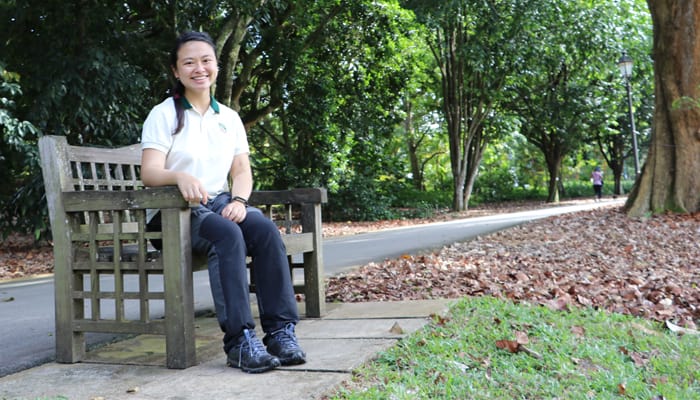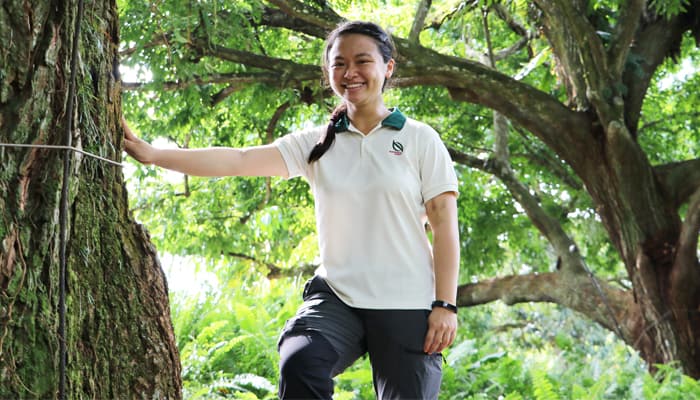With a penchant for protecting and preserving Mother Nature, NParks Scholar Beverly Tan has seen more things than common people. From knobbly sea stars in Singapore to whale watching in Iceland, this horticulture enthusiast is currently managing several plant species at Singapore Botanic Gardens.
Tell Us About Your Scholarship Journey
One of the first memories I have of my childhood is exploring the mudflats and looking for knobbly sea stars at Chek Jawa Wetlands. I’ve always loved being outdoors and finding new curiosities that I don’t get to see on an ordinary day. This led me to consider the different threats facing the natural environment as a result of human activities, and I started to become interested in conservation. A marine biology research project into Singapore’s coral reefs in junior college was my first foray into environmental science, and the experience was a key factor in leading me to pursue a degree in this field.
What Were Some of the Memorable/Interesting Encounters During Your Course of Studies and Why Are They Memorable / Interesting?
In my final year, just before I returned to Singapore to start work, I joined a PhD student in Iceland as a research assistant. I spent three months investigating the response of Blue and Humpback Whales to whale-watching encounters. The aim of the research was to guide a suitable conservation plan for the good of both whales and the local community. In addition to making behavioural observations, we used a variety of tools and techniques for the research. This included using drones to take aerial pictures of the whales, so that we could assess their physical condition and obtain body measurements. We also used the drones to collect the vapour emitted from the whales’ blowholes, for later analysis in the laboratory.
This project allowed me to apply the culmination of my interests after four years of study – adding the use of technology to optimise field research for conservation purposes. As we move forward, threats to the natural environment will become even more complex, and using the most updated technology and tools available will help us to conserve threatened species and their habitats. As a tech hub, Singapore is well placed to capitalise on such opportunities, and I am heartened to see that technology is increasingly being adopted into NParks’ conservation, greenery and wildlife management strategies as well.

Share Your Working Experience With the Singapore Botanic Gardens. Do Also Share About Any Notable Projects You Are Currently Working or Have Worked On.
As a horticulture manager at the Singapore Botanic Gardens, I am in charge of some of the living collections. In particular, I care for the plants in the Ginger Garden, the Dell and Swan Lake area. This means that I help to maintain the existing plants and also enhance the collections according to the curation.
We are currently looking into building up our Fabaceae collection (plants in the Legume family). The expansion of such a collection goes beyond simply planting and later maintaining the plants, it involves the targeted selection of specific species for curation into the collection. Plants can be sourced from a variety of places, including the Gardens’ own Plant Resource Centre, as well as NParks’ Pasir Panjang Nursery. Some of the factors that we consider when selecting new plants are their growth form (whether a shrub, tree, groundcover or climber), natural habitat and preferred microclimate, so that we can understand their required growing conditions.
My work in the Gardens also offers opportunities to be involved in cutting-edge projects such as the OCBC Arboretum in the Gallop Extension, which employs a high-tech system to remotely and continuously monitor the conservation collection of Dipterocarp trees and their environment as they grow.
These are just some of the many exciting and meaningful projects that are going on now, and I am deeply appreciative of the many opportunities that I am given here in the Gardens.
What Advice Would You Have for Those Who Are Exploring Their Scholarship Options?
A scholarship goes beyond an opportunity to pursue a desired course of study. It is a big decision, involving a commitment to an organisation to which you will later be bonded. Passion is an important precursor to success in any field of work. As a scholar, I take every opportunity to learn new areas of interest. This enriches my contribution to the organisation. It goes without saying that you should be interested in the field that you plan to pursue, before applying for a scholarship. But it is also important to consider the organisation’s values. I urge you to do your research – be it through internships, traineeships or listening to others’ experiences, to ensure that your core values align. This way, when you return to serve your bond after your studies, you will be motivated, and see meaning and importance in the work that you do.
BEVERLY TAN HSIN
NParks Undergraduate Scholarship
Age: 24
Attained: Bachelor of Science in Ecological and Environmental Sciences with Management with Honours (First Class), The University of Edinburgh, U.K.
Now: Manager, Horticulture, Singapore Botanic Gardens
From: Raffles Institution

